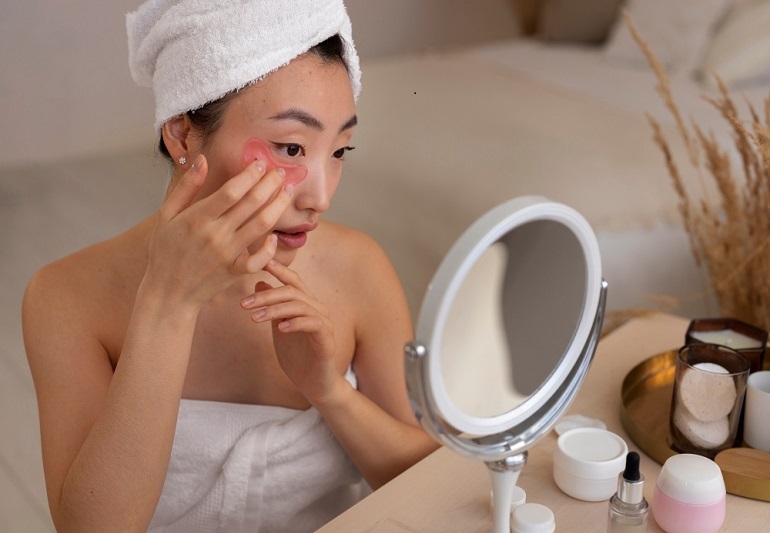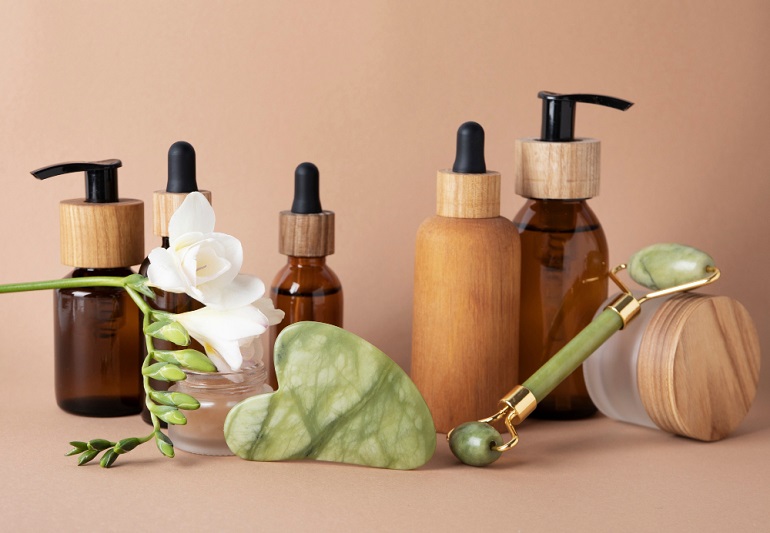Table of Contents
Here, you will learn why skincare regimens don’t follow the same principles universally, especially for sensitive skin. But then comes the real question: what does it mean to have sensitive skin? Imagine this: a new moisturizer; in less than an hour your face is itching as if on fire. Sound familiar? That is the case with sensitive skin.
Sensitive skin is never just sensitive once in a while, it is permanently sensitive, and causes redness, irritation, or more, even with the smallest exposure to certain substances. But how does one create a routine that fosters the skin instead of causing issues? Except for any further ado, let us look at the must-know about skincare routines for sensitive skin.
What Does It Entail to Face Sensitive Skin Challenges?
It is not a myth then that many people’s skin is sensitive. If the skin especially your face, has a raw feel, itchy, redness occurs, or becomes sensitive, it reacts to certain products then it belongs to this category. Such manifestations can be associated with a damaged skin surface, allergic reactions, or preexisting skin diseases, such as rosacea and atopic dermatitis. Educating anyone’s self on what your sensitive skin requires is the beginning of attaining that great complexion.
How does developing a personal daily skincare regime matter?
Skin is the body’s maximum part and first barrier against the surrounding environment. In the case of people with sensitive skin, the barrier function is reduced which means that the skin is easily damaged and irritated. It’s therefore important to incorporate a regular skincare regimen as a defence barrier and keep the skin free of inflammation by trying this skin-friendly moisturizer.
The Nature of Sensitive Skin and Why It Matters
Your skin is just as individual as you are. People with sensitive skin have difficulty finding the perfect moisturization and protection product. Low-quality elements and over-aggressive processes are equally dangerous. The idea is to minimize as much as possible your routine but at the same time guarantee that each product you apply to your face is beneficial for your skin.
Creating Best Skincare Regimen For Sensitive Skin Type
Morning vs. Night Skincare Routine: Why Both Matter?
The skin has its requirements at different times of the day, so for this reason, it requires special attention. In the morning you’re protecting your skin from what the day has in store for it – the rays, the pollutants and stress. During the night, your skin becomes active to work on repairing which has suffered throughout the day. An effective skincare regimen for such skin types has to address them to maintain skin identity and health.
Basic Skincare Routine for Sensitive Skin
Cleanse Gently Without Stripping
This comes true since cleansing is the backbone of every effective skincare regime. However, for sensitive skin, it is so important to use a mild and non-foaming cleanser that on the one hand and, on the other hand, effectively cleanses the skin from impurities without creating the sensation of tightness. Choose products with terms such as ‘soap-free’ or ‘pH-balanced’ on their packs as a sign that they are quite mild for daily use.
Hydrate with a Sensitive-Skin-Friendly Moisturizer
There’s no need to tell you that even your skin needs moisturizing, but it’s important to remember about hydration as it is a part of the skin barrier. Choose a lotion that has little or no scent, this will ensure that the skin does not come into contact with chemicals that may worsen the dryness, go for lotions with hyaluronic acid or ceramides.
Protect with Sunscreen: A Daily Essential
Covers are important at any given time of the year but this is especially important for skin that easily gets affected by UV radiation. Go for a sunscreen with a broad-spectrum protection level of 30 or more preferably a physical block of zinc oxide or titanium dioxide as they are more unlikely to trigger skin reactions.

Morning Skincare Routine for Sensitive Skin
- Step 1: Start with a Gentle Cleanser
Start your morning with a purging process to wash off the residues and oils that may have formed at night. A hydrating non-sulfate formula of the cleanser will wash off the skin without leaving it dry or irritated.
- Step 2: Apply a Hydrating Toner
A toner can be a bonus layer of hydration and get the skin ready for the rest of the products going to encounter. Pay more attention to the list of ingredients; try to select alcohol-free toners containing chamomile or aloe gel.
- Step 3: Use a Lightweight Serum
Serums are dense products in which active substances are delivered to the skin. For acute sensitive skin, opt for a ‘no frills’ serum specially designed to address specific issues that may have a person – redness or dryness.
- Step 4: Lock in Moisture with a Soothing Cream
Sealing is a crucial activity after applying moisturizer. A daytime moisturiser is a cream containing, ceramides or niacinamide that restores the skin’s barrier and prevents sensitivity to the sun’s UV rays.
- Step 5: Finish with Broad-Spectrum Sunscreen
Sunscreen should not be missed out in the morning. An SPF formulated as a broad spectrum going beyond protection from UV rays is useful in preventing further inflammation or sensitivity.
Night Skincare Routine for Sensitive Skin
- Step 1: Remove Makeup and Impurities
Finally, a mandatory thing for the skin to remove makeup, oil and all the accumulated impurities. Try using gentle micellar water or a cleansing oil which doesn’t irritate your skin or make it feel dry.
- Step 2: Use a Calming Cleanser
Once again wash the face with a gentle non-sting cleanser to remove any remaining make-up or traces of pollution on the skin to give a clean face.
- Step 3: Incorporate an Anti-Aging Product
If, by the time you’re through with the skin-care regimen, your skin is ready to start its repair process for the night, introduce an anti-ageing cream or serum suitable for sensitive skin. When evaluating anti-ageing, search for retinol substitutes such as bakuchiol, which offer similar issues but contain less inflammation.
- Step 4: Apply a Nourishing Night Cream
A night cream should be thicker than the day creams you use, to nourish the skin during the night. Some popular ingredients that help with skin care include shea butter, peptides and squalane for sensitive skin.
- Step 5: Spot Treatments for Problem Areas
In the case of using particular creams for targets such as breakouts or dark spots, use them after night cream has been applied. These products mustn’t contain ingredients likely to irritate sensitive skin and are designed for sensitive skin.

Korean Skincare Routine for Sensitive Skin
Korean skincare is most popular for being very elaborate and often consisting of multiple steps or layers. Though the procedure described the Korean 10-step skincare process, one can easily adopt it for sensitive skin.
The Essence of Korean Skincare Philosophy
Thus, Korean skincare is all about moisture, minimal irritation and damage, and protection. It is a simple plan of using water-based lightweight products to create a healthy glow on the skin.
Adapting the 10-Step Routine for Sensitive Skin
Just remember, you don’t have to do all of these 10 steps and the way to use them is flexible. However, it is necessary to concentrate on the basic principles which are essential to improve – cleansing, hydration, and protection. Select the products without some ingredients that are triggering your skin such as alcohol and synthetic fragrances.
Key Korean Skincare Products to Consider
Toners, water-like elixirs, and sheet masks are inevitable in Korean routines. Choose products containing soothing ingredients such as green tea, snail mucin, centella asiatica, and the like.
Simplifying the Process: Less Is More
For sensitive skin, the less the product applied, the better it will be. Avoid going overboard with the Korean routine you have learnt, instead follow a simple regime that has products that hydrate the skin. Do not apply skin care products in layers as this could sometimes cause a lot of harm to your skin.
Best Skincare Routine for Sensitive Skin
Creating a skincare routine for sensitive skin involves carefully selecting products that soothe and protect without irritating. Let’s fractionate it step by step.
Step 1: Gentle Cleansing
Importance of Choosing the Right Cleanser:
Cleansing is the foundation of any skincare routine, but for sensitive skin, it’s crucial to choose a cleanser that’s gentle and free of harsh chemicals. Select skincare items especially for “sensitive skin” statements, that have no fragrance and are preferably hypoallergenic.
Recommended Products for Gentle Cleansing:
Some of the best options include micellar water, cream cleansers, or hydrating gels that cleanse without stripping the skin’s natural oils.
Step 2: Hydration and Moisturizing
Why Hydration is Crucial for Sensitive Skin:
Hydration isn’t just about drinking water; it’s about ensuring your skin retains moisture to stay supple and resilient. For sensitive skin, dehydration can lead to increased irritation and breakouts.
Best Moisturizers for Sensitive Skin:
Opt for moisturizers with soothing ingredients like aloe vera, chamomile, or hyaluronic acid. These ingredients help lock in moisture without causing a reaction.
Step 3: Sun Protection
The Role of Sunscreen in Protecting Sensitive Skin:
Sunscreen is non-negotiable, even for sensitive skin. UV rays can exacerbate sensitivity, leading to redness and premature aging. It is also effective in removing tan and sunburn.
How to Choose the Right Sunscreen:
Look for a broad-spectrum sunscreen with SPF 30 or higher, and ensure it’s free from alcohol, fragrance, and other irritants. Mineral-based sunscreens with zinc oxide or titanium dioxide are often well-tolerated by sensitive skin.
Step 5: Regular Exfoliation
Exfoliants Suitable for Sensitive Skin:
Exfoliation is essential for removing dead skin cells, but overdoing it can damage sensitive skin. Limit exfoliation to once a week or even less frequently, depending on your skin’s tolerance. Opt for enzyme exfoliants or products with poor concentrations of alpha hydroxy acids (AHAs) like lactic acid, which are less likely to irritate.

Anti-Aging Skincare Routine for Sensitive Skin:
The desire to combat aging is universal for sensitive skin, anti-aging products can be tricky. The key is to choose products that are both effective and gentle.
Safe ingredients to look for like niacinamide, peptides, and gentle antioxidants (like Vitamin E) can offer anti-aging benefits without irritating.
Simple Skincare Routine for Sensitive Skin
Keeping your skincare routine simple can decrease the risk of irritation while ensuring your skin gets the care it needs.
Step-by-Step Morning Routine:
1. Cleanse with a gentle cleanser.
2. Apply a hydrating serum (optional).
3. Moisturize with a lightweight, soothing moisturizer.
4. Apply a mineral-based sunscreen.
Step-by-Step Evening Routine:
1. Remove makeup with a gentle makeup remover.
2. Cleanse your face with a mild cleanser.
3. Apply a calming serum or treatment (e.g. niacinamide or peptide serum).
4. Moisturize with a richer cream to lock in hydration overnight.

Daily Skincare Routine for Sensitive Skin
Consistency is key when caring for sensitive skin. A daily routine helps maintain the skin’s balance and prevents flare-ups.
Importance of Consistency
Following your routine daily ensures that your skin remains hydrated, protected, and free from irritation. Skipping steps can disrupt the balance and lead to issues like dryness or breakouts.
Choosing the Right Products for Sensitive Skin
What to Look for in Skincare Products
When purchasing skincare it is advisable to go for products that do not cause allergic reactions such as hypoallergenic, non-comedogenic, and those that undergo no fragrance. These are relatively non-irritating to the skin and do not readily cause skin reactions in most of the customers.
Ingredients to Seek
Hydroquinone and related compounds reduce hyperpigmentation and melasma-melanophore interactions, while L-ascorbic acid, niacinamide, aminoglycosides, and aloe vera help in hydration and skin repair. These ingredients assist in maintaining the skin barrier and prevent why the skin becomes irritated.
Ingredients to Avoid
Do not use alcohol, synthetic dyes or parabens. These can be quite irritating and they are not essential to promote healthy skin and body.
Recommended Brands for Sensitive Skin
Affordable Options
Cetaphil, La Roche Posay, Simple and some others are one of the best brands for sensitive skin and rate quite ok for standard prices.
High-End Choices
If you are willing to spend a bit more, special brands such as Drunk Elephant, Avène or Paula’s Choice offer products designed particularly for sensitive skin.
Adapting Your Routine for Different Seasons
- Winter Skincare Adjustments
It is common knowledge that winter hurts our skin, particularly those with sensitive skin. For dry skin move to a more moisturizing cream and introduce face and hair masks.
- Summer Skincare Essentials
The type of product to use should change during the summer while your sunscreen should be one that can work well with sweating. Last but not least: water from the inside out.
The Role of Diet and Lifestyle in Skincare
Foods That Benefit Sensitive Skin-
Healthy nutrient-dense foods such as antioxidants, omega-3 fatty acids, vitamins A, B, C and E are good for the skin. Omega foods such as salmon, walnuts, and green vegetables should be taken.
Managing Stress for Healthier Skin-
Stress is known to worsen skin sensitisation. Finish all the looks with a relaxation technique such as yoga, meditation, or even a hobby that is not stressful for your skin and mind.
Frequently Asked Questions
1. What is the best skincare routine for sensitive skin?
The recommended skincare routine for sensitive skin entails washing your face using a mild face wash and applying a moisturizer and a broad-spectrum sunscreen in the morning. As well as applying a calming cleanser, nourishing night cream, and a gentle anti-aging product at night.
2. Which skincare brand is best for sensitive skin?
Cetaphil, La Roche-Posay, and Avène are some of the most recommended skincare brands for sensitive skin since their products are less abrasive and more geared toward skincare.
3. What skincare products should I use for sensitive skin?
Seek for hypoallergenic products that preferably do not contain some scent and those contain ingredients like aloe vera, hyaluronic acid, and ceramides.
4. How often should I exfoliate sensitive skin?
Skin that is prone to irritation should be exfoliated not more than twice a week and this should be done using a chemical exfoliant that is milder than physical exfoliants such as lactic acid.
5. Can I use anti-aging products on sensitive skin?
Yes, but select products that are gentle on the skin, for example, those that use bakuchiol instead of retinol since it is likely to cause skin sensitivity.
Conclusion
Elegant skin is not about the best trend; it is about the needs of your skin and giving the skin the best attention.
Products for sensitive skin should be mild and non-irritating to the skin and must applied in moderation and at regular intervals. When you develop a skin care programme that fits your skin type and is adhered to, then your skin will reflect a healthy natural glow constantly.


